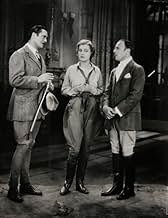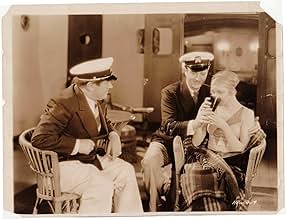Adicionar um enredo no seu idiomaAt a big party, Roger Fallon, now a woman-hater, right to the core - this all due to a failed marriage and disastrous love affairs - talks to Herbert Drake. Herbert who is happily married, b... Ler tudoAt a big party, Roger Fallon, now a woman-hater, right to the core - this all due to a failed marriage and disastrous love affairs - talks to Herbert Drake. Herbert who is happily married, bets Fallon that the next woman who walks into the room, whoever she is, won't let Fallon k... Ler tudoAt a big party, Roger Fallon, now a woman-hater, right to the core - this all due to a failed marriage and disastrous love affairs - talks to Herbert Drake. Herbert who is happily married, bets Fallon that the next woman who walks into the room, whoever she is, won't let Fallon kiss her for 48 hours. Fallon takes the bet. Suddenly, a very beautiful and sexy woman walk... Ler tudo
- Direção
- Roteiristas
- Artistas
- Prêmios
- 1 vitória no total
- Maid
- (não creditado)
- Party Guest
- (não creditado)
- Office Boy
- (não creditado)
- Party Guest
- (não creditado)
- Butterfield
- (não creditado)
- Sommers - Fallon's Butler
- (não creditado)
- Jeanne's Dancing Partner
- (não creditado)
Avaliações em destaque
This is a pre-Code film and its departures with convention pertain mostly to its examination of the (changing) roles of women, particularly as they pertain to romance and marriage.
Herbert Drake (Roland Young) prattles on about his parental views of women to Roger Fallon (Edmund Lowe). This amuses Fallon, perhaps because Drake's opinions are even more patronizing than his own. Drake is also very arrogant in general and refuses to ever admit he is wrong--as if it's a matter of principle.
At one point, Drake--eager to prove his superior knowledge of women--bets Lowe $10,000 that he cannot kiss the next woman who enters the veranda. A very Shakespearian device to be sure. And of course Mrs. Drake (Jeanette MacDonald in a non-singing role) obliges.
Mrs. Drake aka Jean immediately learns of the wager and is insulted, but she insists that the bet remain--allegedly to test her faithfulness as a wife.
The film also features Una Merkel as Tallulah Hope, Jean's friend who spouts non sequiturs as fast as Gracie Allen ("I think scenery adds so much to a view!").
Though its roots in the theater are rather obvious, the story has charm and the acting is fun to watch, even if it's not the best. What Loy and Powell could have done with this!
I enjoyed this film a lot, but then I'm a huge fan of Edmund Lowe in just about everything he made. I also generally enjoy Roland Young a lot. Jeanette MacDonald I think was one of the most beautiful women of all time in film, with eyes that go on and on and on. Una Merkel is a favorite of both my wife and I. I won't say that any kind of majority of modern viewers will enjoy this film much because its mores (those of its time) and ideas about men and their rôles in society and likewise women will be viewed as old-fashioned and wrong. Still, I enjoyed the film quite a bit, and I'd recommend it to one and all, especially those who enjoy the pre-codes. This has plenty of pre-code material in it to satisfy those looking for it. Oh, and Louise Beavers makes a very non PC entrance and exit as part of the context. Her black context will be viewed as quite stereotypical of that time, but racist today - and it certainly is!
Edmund Lowe plays the wealthy and dapper Roger Fallon. He has been married once to Doris, and her breaking his heart has made him a confirmed bachelor. When she comes to him and say she wants him to set up a trust fund for her so she can remarry, he readily agrees. This takes him to the office of his lawyer, Herbert Drake (Roland Young) who, although he disagrees with Roger's move, agrees to draw up the paperwork. They then launch into a discussion about women. Roger says all women are bad - that is why he is so generous to Doris, because she taught him this lesson while they were married. Herbert says all women are children, and whether they are good or bad children is entirely the husband's fault.
Well, it turns out that Roger ends up invited to the Fallon home, and meets Herbert's wife (Jeannette McDonald as Jeanne.). He finds her charming, and Roger ends up betting Herbert ten thousand dollars that he can kiss his wife before the weekend is up. The problem is, Jeanne finds out about this bet too, and plans to teach both men a lesson. Una Merkel rounds out the cast doing what she does best, being the mischievous but loyal friend - in this case to Jeanne.
This film has a lovely score that is unfortunately seldom heard. The art deco is beautiful to look at, and everybody here plays their roles with great aplomb. The problem is the script. There is just no meat on the bones. This would have been a great two reel Vitaphone short, but it is just stretched too thin to be an entire film, even a 70 minute one. It makes me wonder if this was one of those films originally intended to be a musical - after all this is Jeannette McDonald's only film of the 30s where she doesn't sing a note - and then the early 30s film musical craze landed with such a thud that Fox decided to forge ahead without the musical portions.
It seems to be going for that Lubitsch touch, but instead of touching it, he just brushed up against it.
It is elegant and sophisticated and very highly recommended.
Unfortunately, the only DVD print available, through Loving The Classics, is washed out, fuzzy, dark at times and the entire last 30 minutes of it involves a shaking screen. It's taken from a VHS copy with horizontal blips in a few scenes. There are no songs for anyone in the cast.
MacDonald doesn't make her entry until 21:45 into the action.
Risqué gay innuendo from MacDonald: "What are you two men doing on a yacht? Cruising? "
Caesar Romero is seen for one second taking over Merkel as dancer, when Kerrigan exits.
Saw it today at MoMA, just before Howard's "Trial of Vivienne Ware", and it's almost impossible to believe that these two films were made by the same director and just a year apart.
"Trial" is a lightning-fast melodrama, fast even by pre-code standards, and very entertaining. This, on the other hand, has that awful early talkie pacing that you always hear about but rarely see so vividly. It also has uninspired direction and clueless casting of two of the three leading male roles.
J.M. Kerrigan is the hero's 'comic sidekick', the let's-go-out-and-party guy that Edmund Lowe picks up chicks with. Ahh... J.M. KERRIGAN?!! Are they kidding? They couldn't get Lupino Lane, or Roscoe Karns, or... ANYBODY ELSE?!!! Kerrigan seems twenty years too old, and looks for all the world like he wants to sit in a Morris chair sipping port while his dog lies at his feet, dying.
Edmund Lowe is the lead, and he's even worse. He's sincere and naturalistic, but BORING as all get-out. There are no stakes, no 'pep', no color, no comic liveliness. He's just not a comedy guy. If it had had somebody like Frank Fay, say (whose comedies of this period are not bad at all), or Lowell Sherman, or Melvyn Douglas, or...
The rest of the cast is fine -- McDonald, Young, Merkel, all are people who know their way around a comic scene -- but Lowe, Kerrigan, and the pace and direction sink it.
A pity, because the basic idea, dated as it is, is still funny, and this could have been a lot of fun... if only it had been directed and acted by people with a feeling for comedy.
Anyhow, this is what it is. Don't go out of your way for it.
Você sabia?
- CuriosidadesFilm restored by MOMA in 2015 and premiered at Turner Classic Movie Festival.
- Citações
Jeanne Drake: There's no virtue in a woman being good if she's never had a chance to be bad!
- ConexõesAlternate-language version of ¿Conoces a tu mujer? (1931)
Principais escolhas
Detalhes
- Tempo de duração1 hora 10 minutos
- Cor
Contribua para esta página





















